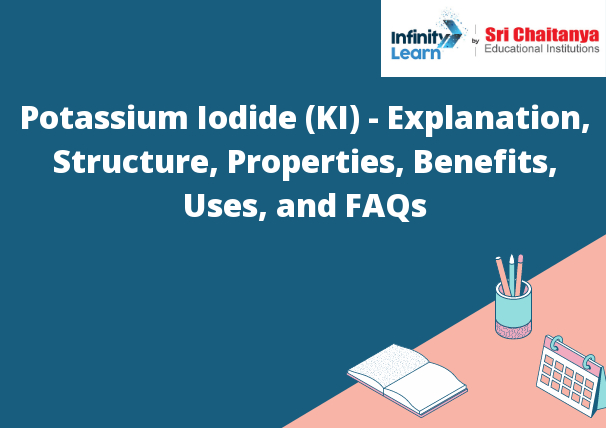Table of Contents
What is Potassium Iodide (KI)?
Potassium iodide (KI) is a salt of potassium and iodide. It is a white, crystalline solid that is soluble in water. It has a molecular weight of 166.3 g/mol. It is a weak base and a strong electrolyte. It is used as a pharmaceutical and as a food additive. It is used to prevent and treat iodine deficiency. It is also used to treat radiation exposure.

Potassium Iodide Structure (KI Structure)
Potassium iodide is a salt with the formula KI. It is composed of potassium ions and iodide ions, and is therefore an ionic compound. It is a white crystalline solid that is soluble in water. The potassium ions and iodide ions are held together by ionic bonds.
Properties of Potassium Iodide
- Potassium iodide is a salt with the chemical formula KI. It is a white, crystalline solid that is soluble in water. It is used as a medication and as a food additive.
- Potassium iodide is a salt that is made up of potassium and iodide ions. It is a white, crystalline solid that is soluble in water. It is used as a medication to treat hyperthyroidism and to protect the thyroid gland from radiation exposure. It is also used as a food additive to prevent thyroid cancer.
Benefit of Taking Potassium Iodide Compound During a Radiological Accident
Potassium iodide (KI) is a salt of potassium and iodide that is administered orally to people exposed to high levels of radioactive iodine. KI can protect the thyroid gland from radioactive iodine. Radioactive iodine is a form of iodine that is released when nuclear materials are damaged. The thyroid gland absorbs radioactive iodine and can become damaged.
Saturated Potassium Iodide Solution
Saturated potassium iodide solution is a solution that contains potassium iodide in a concentration that is greater than the solubility limit. This solution is formed by slowly adding potassium iodide to water until no more iodide will dissolve.
Uses of Potassium Iodide
- Potassium iodide is used as a thyroid blocker in cases of radiation exposure.
- It is also used to treat other conditions, including hyperthyroidism, goiter, and thyroid cancer.
Thyroid Protection
- Thyroid hormones are essential for normal growth and development, and they play a role in the regulation of many body processes. The thyroid gland is located in the neck and produces two main hormones, thyroxine (T4) and triiodothyronine (T3), which control the body’s metabolic rate.
- Exposure to radiation, including radiation therapy, can damage the thyroid gland and cause problems with thyroid function. The thyroid gland is particularly sensitive to radiation exposure during the early years of life, when it is growing and developing.
- Radiation therapy can cause thyroid damage in two ways:
- Direct radiation damage to the thyroid gland
- Indirect radiation damage to the thyroid gland, caused by radiation exposure to other parts of the body
- Both types of radiation damage can lead to problems with thyroid function.
- There is no definitive evidence that taking thyroid protective supplements, such as iodine or selenium, can prevent radiation-induced thyroid damage. However, there is some evidence that these supplements may be helpful in reducing the risk of thyroid damage.
- There is no evidence that taking thyroid protective supplements can prevent radiation-induced thyroid cancer.
Nuclear Accidents
Nuclear accidents are a rare but serious events that can have a devastating effect on people and the environment.
Some of the most serious nuclear accidents include:
- The Chernobyl disaster in 1986, which caused the death of thousands of people and the contamination of large areas of land.
- The Fukushima Daiichi nuclear disaster in 2011, which caused the evacuation of over 100,000 people and the release of large amounts of radiation.
Side Effects of Potassium Iodide
Potassium iodide is a salt that is used to prevent the thyroid gland from absorbing radioactive iodine. When used as directed, it is a safe and effective way to protect the thyroid from radiation exposure. However, there are some potential side effects of potassium iodide, including:
- Nausea
- Vomiting
- Diarrhea
- Abdominal pain
- Skin rash
These side effects are usually mild and short-lived. If you experience any of these side effects, talk to your doctor.









